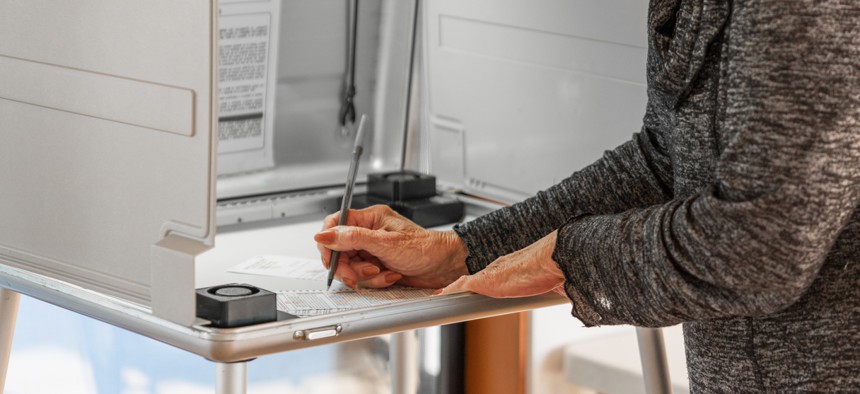Nevada Pushes to Hold First Presidential Primary in 2024

istock.com/Bill Oxford
A bill, awaiting a signature from Gov. Steve Sisolak, would switch the state from a caucus to a primary system and push it ahead of Iowa and New Hampshire, traditionally the first two states to vote for presidential candidates.
Nevada would be the first state to vote in the 2024 presidential primary under legislation passed Monday, a proposal that would undo decades of political precedent and likely garner pushback from lawmakers in states that traditionally kick off the voting process.
The legislation, passed 15-6 by the Senate and 30-11 in the Assembly, would change Nevada’s voting process from a caucus to a primary and move the date to the “first Tuesday in February of each presidential election year.”
If signed into law by Gov. Steve Sisolak, the bill would place Nevada’s primary ahead of the Iowa caucuses (traditionally the first in the nation) and the New Hampshire primary.
Nevada Assembly Speaker Jason Frierson, a Democrat from Las Vegas who introduced the legislation, said the state was a better choice to lead off candidate nominations due to its size, mix of residents and firsthand experience with important issues like immigration and climate change.
“As Nevadans, we know how unique our state is,” Frierson said in April at a committee hearing. “Our diverse population better represents that of the rest of the country, yet our state is small enough for more of our voices to be heard behind the highest elected office in the land.”
The move to change the state’s primary process was led by a behind-the-scenes push from former U.S. Senate Majority Leader Harry Reid, the Associated Press reported. Proponents of the measure argued that party-run caucuses, which focus on in-person neighborhood meetings, are confusing and harder to run than traditional primaries, which are overseen by state and local officials.
“The confusion of and disengagement from the caucus process would go away, thereby creating a system where a voter will simply choose, on a card, their preference for a presidential candidate,” Andre C. Wade, state director of the LGBTQ+ civil rights organization Silver State Equality, said in written testimony supporting the bill. “Oversight of the process would be handled by the secretary of state and county clerks.”
Even if Sisolak signs the bill, both national political parties would have to approve the change to the 2024 calendar. Democrats have reportedly been discussing an overhaul of the calendar for months, but Republicans have been vocal in their opposition to the Nevada proposal. In written testimony, Michael J. McDonald, chairman of the Nevada Republican Party, said the bill could put the state’s delegates at risk, potentially stripping Nevada of its power in the nominating process.
“When Democrats in Florida attempted to move their primary in 2007, the DNC stripped Florida of all its national delegates. This move would violate both Democrat and GOP party rules, resulting in penalties lessening our voice,” he wrote. “There is no reason to move our caucus. First in the West is a title we have been proud to wear, and we believe it should continue.”
Nevada could also face pushback from other early-voting states, including New Hampshire, which traditionally holds the nation’s first primary, following the Iowa caucuses. Under state law, New Hampshire must hold its contest either on the second Tuesday in March or “7 days or more immediately preceding the date on which any other state shall hold a similar election.” That means the state could simply move its primary ahead of Nevada’s, regardless of when that contest is scheduled.
“Our law hasn’t changed,” New Hampshire Secretary of State Bill Gardner told Fox News on Tuesday. “I’ll follow the law like I always have, like the oath of office I take says.”
Sisolak has yet to sign the bill, though he previously supported the idea of switching the state from a caucus to a traditional primary system.
"It’s clear to me that despite the strong reforms we instituted for 2020, the caucus process has fundamental challenges that make it too difficult for too many Nevadans to participate,” he said last year. “As we look ahead to the next presidential election cycle, I believe we must further open up the process of selecting our nominee and I intend to work with our state party and leaders in the state Senate and Assembly to review how we could switch to an early presidential primary.”
Kate Elizabeth Queram is a senior reporter for Route Fifty and is based in Washington, D.C.
NEXT STORY: 8 Lessons to Break the Poverty Cycle in Communities





